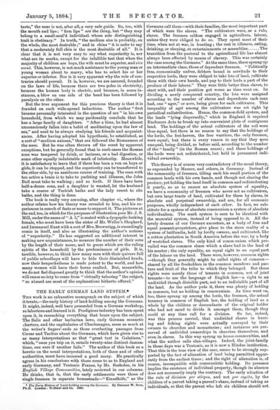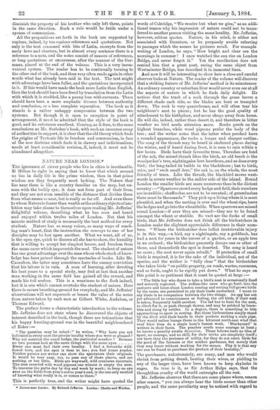THE EARLY GERMAN LAND SYSTEM.*
THIS work is an exhaustive monograph on the subject of which it treats,—the early history of land-holding among the Germans. It might, indeed, well have proceeded from a German workshop, so laborious and learned is it. Prodigious industry has been spent upon it, in ransacking everything that bears upon the subject. The Salk and other barbarian laws, early German monastic charters, and the capitularies of Charlemagne, seem as much at the writer's fingers'-ends as those everlasting passages from Caesar and Tacitus about the Germans, which have given rise to as many interpretations as that "great text in Galatians," which, " once you trip on it, entails twenty-nine distinct damna- tions, one sure if another fails." The author of this book as a heretic on the usual interpretations, both of these and of other authorities, must have incurred a good many. He practically agrees in his conclusions with those come to as to England and early Germany, and Teutonic France, by Mr. Seebohm, in his English Village Communities, lately reviewed in our columns. He thinks, that is, that the early settlements were those of single freemen in separate homesteads—" Einzelhofe," as the • The Early History of Land-holding among the Germans. By Denman W. Ross, Ph.D. London : Trilbner and Co. 1883.
Germans call them—with their families, the most important part of which were the slaves. " The cultivators were, as a rule, slaves. The freemen seldom engaged in agriculture labour, unless they were obliged to do so. They spent most of their time, when not at war, in hunting ; the rest in idleness, eating, drinking, or sleeping, at entertainments or assemblies The transition from the pastoral to the agricultural life has almost always been effected by means of slavery. This was certainly the case among the Germans." At the same time, there sprang up an intermediate class, those of dependent freemen. " Politically free, economically unfree, debtors bound in servitude to their respective lords, they were obliged to take lots of land, cultivate them with their own hands, and pay to their lords a part of the produce of their labour." They were little better than slaves, to start with, and their position got worse as time went on. In dividing a newly conquered country, the lots were assigned according to the number of slaves and dependents each man had, one " ager," or acre, being given for each cultivator. This inequality of agri among the cultivators was set right by periodical redistribution. Hence, the common-field system, and the lands "lying dispersedly," which in England it required Enclosure Acts to break up into convenient plots of contiguous land. The holdings of the actual cultivators of the soil were thus equal, but there is no reason to say that the holdings of the lords, the frei-herren, the free warriors, the only freemen, were equal; but there is every reason to say that they yere unequal, being divided, as before said, according to the number of the " family " (in the Roman sense) ; and these holdings of the lords were not redistributed, but held in permanent indi- vidual ownership.
This theory is of course very contradictory of the usual theory, as expounded by Maurer, and others, in Germany. Instead of the community of freemen, tilling each his small portion of the common lands with his own hands, and though not sharing the produce, yet holding the land itself in common and redistributing it yearly, so as to ensure an absolute system of equality, we have a community of freemen who never act as cultivators, but own large tracts of land, cultivated for them by slaves, in absolute and perpetual ownership, and are, for all economic purposes, wholly independent of each other. In fact, we sub- stitute for a system of absolute communism a system of absolute individualism. The mark system is seen to be identical with the manorial system, instead of being opposed to it. All the lovely dreams of our German ancestors, as a body of free and equal peasant-proprietors, give place to the stern reality of a system of latifundia, held by lordly owners, and cultivated, like a cotton plantation in South America before the war, by a body of wretched slaves. The only kind of comm unism which pre- vailed was the common share which a slave had in the land of his master ; the only equality, an equal right to an equal part of the labour on the land. There were, however, common rights —though they generally might be called rights of common— shared by all the freeholders in the common meadows and pas- ture and fruit of the tribe to which they belonged. But these rights were merely those of tenants in common, not of joint tenants—to use the language of English law—a right to an undivided though divisible part, not to an indivisible part of all the land. As the author puts it, there was plenty of holding in common, but no holding in communism. As time went on, too, there sprang up among the lords, the freemen, the actual tenancy in common of English law, the holding of land as a whole by the children or descendants of the original holder who had not cared to divide it amongst them, though they could at any time call for a division. So far, indeed, was this process carried, that undivided shares in hunt- ing and fishing rights were actually conveyed by their owners to churches and monasteries ; and instances are pre- served of undivided ownerships in churches themselves, and even in slaves. In this way sprang up house-communities, and what the author calls clan-villages. Indeed, the joint-family in those days was a Teutonic, as it is now a Hindoo institution. That this is the true view of the case, seems to be strongly sup- ported by the fact of alienation of land being permitted appar- ently from the earliest times ; and the right of alienation is, of coarse, incompatible with communistic holding. Its presence implies the existence of individual property, though its absence does not necessarily imply the contrary. The early adoption of the rule of division per stirpes, and not per capita, by the children of a parent taking a parent's share, instead of taking as individuals, so that the parent who left six children should not
diminish the property of his brother who only left three, points in the same direction. Such a rule would be futile under a system of communism.
All the propositions set forth in the book are supported by copious, indeed, by too copious references and quotations. Not only is the text crammed with bits of Latin, excerpts from the early laws and charters, but in almost every sentence there is a reference to a note, and the notes consist of masses of references, or long quotations or excursuses, after the manner of the Ger- mans, placed at the end of the volume. This is a very incon- venient system. The reader has to be continually turning to the other and of the book, and then very often reads again in other words what has already been said in the text. The text might with advantage have been fuller, and the quotations incorporated in it. If this would have made the book more Latin than English, then the text should have been freed by translation from the Latin with which it is studded, like a penny bun with currants. There should have been a more emphatic divorce between authority and conclusion, or a less complete separation. The book as it stands is a rather unhappy compromise between the two systems. But though it is open to exception in point of arrangement, it must be admitted that the style of the book is good, and its substance excellent. Coming, as it does, to the same conclusions as Mr. Seebohm's book, with such an immense array of authorities in support, it is clear that the old theory which finds the origins of Teutonic life in freedom and communism, in face of ?he new doctrine which finds it in slavery and individualism, needs at least considerable revision, if, indeed, it must not be abandoned altogether.







































 Previous page
Previous page